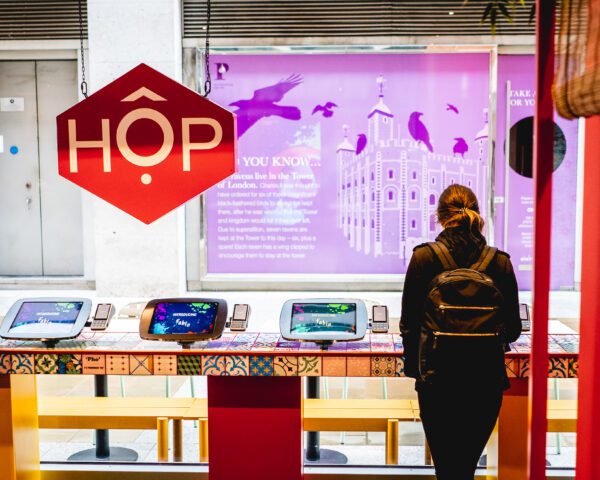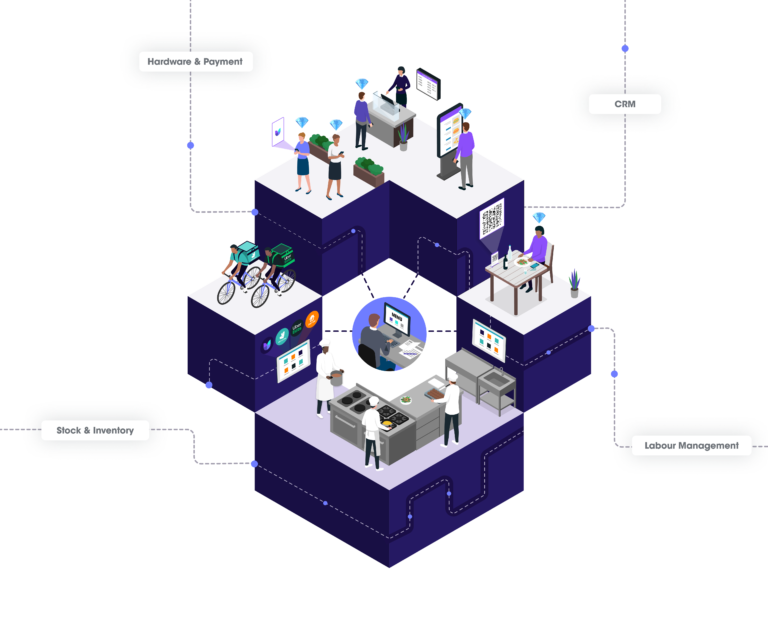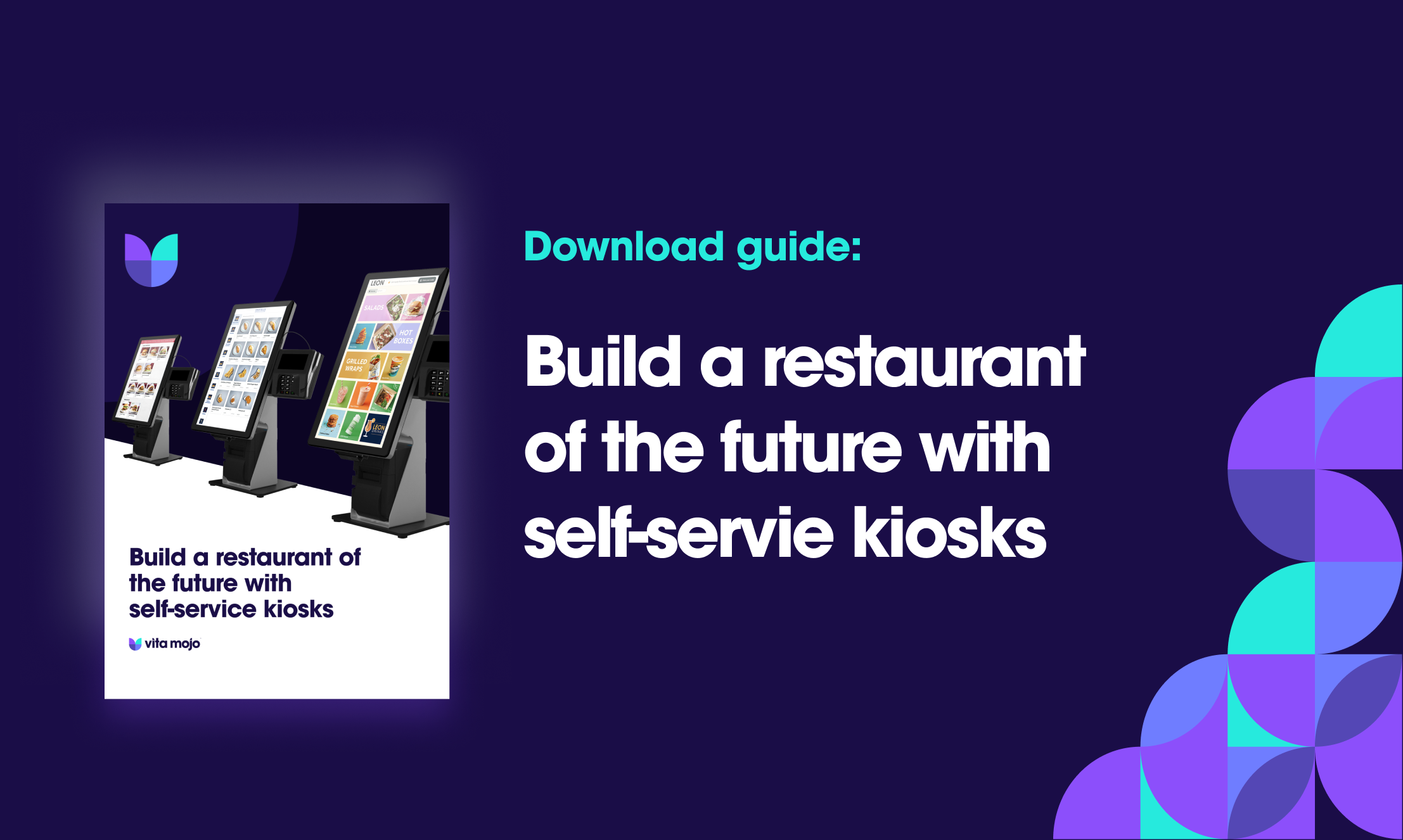Guests love using self service kiosks, in fact 95% of Gen Z prefer using them when placing orders. Discover why fast-food giants like McDonald’s and KFC have been using self service kiosks for more than a decade in our guide below.
From LEON to YO! and Tossed, self service kiosks have become a staple piece of hospitality tech. And it’s official: customers love them. They’re fast, easy-to-use and make personalisation a breeze. No longer a nice-to-have, self serve kiosks are a vital part of the quick service restaurant ecosystem.
And they’re great for operators too. Not only will they free up your staff, they’ll increase your average order value, improve order accuracy and cut down those long queues for the till during peak times. It’s no wonder, more and more operators across the sector are installing self service kiosks. Read on to find out seven incredible benefits, and to discover why kiosks reach their full potential as part of a unified order management system.
What are the benefits of self service kiosks?
1. Increase average transaction value with upsells and meal deals
Put simply, customers spend more using self service kiosks.
A good kiosk experience lets customers explore the whole menu, providing enticing images, thorough meal details and a full range of optional extras. Kiosks never forget to upsell with sides, meal deals and targeted promotions through through loyalty programmes. Without the pressure of people behind queuing for the till, customers have more freedom and time to browse the full menu, ensuring they get the meal they really want.
61% of customers spend more when placing orders through kiosk solutions compared to ordering at the till.
Increased digital adoption and ATV
Digital ordering has enabled I am Doner to increase customer spend by 43% with smart upsells and meal deals. Meal deals increased sales of two dishes from 3-40% in just one month.
2. Streamline labour and drive efficiency
The beauty of kiosks is that they allow operators to effectively outsource order taking to their customers. With the industry facing unprecedented labour shortages and demand for higher wages, self order kiosks can help alleviate external pressures. By redeploying staff to back-of-house operations or customer support roles, you’ll increase throughput, speed up meal preparation and create a better customer experience. Plus, with customers self ordering, operators can cut back on staffing costs by reducing the number of staff they have on shift during quieter periods.
3. Increase throughput
People queuing round the corner to buy your food might feel good, but the reality is it’s probably costing you sales.
81% of customers find restaurant queues frustrating, with 61% admitting they’d leave and go elsewhere if they had to wait more than 10 minutes. In the traditional QSR set-up, taking orders often becomes an operational bottleneck, limiting takings during peak hours. Self service kiosks increase order-taking capacity exponentially; reducing wait times, attracting more customers and allowing operators to take more orders than through an EPOS.
Smart use of kiosks can cut queues by up to 50% and reduce the risk of losing customers to the back of the queue during peak hours.
4. Improve order accuracy
With the customer in control of inputting their order, there is less risk of time-strapped cashiers mishearing or misinterpreting an order, reducing overall margin for error. This is vital for customers with allergies.
5. Customers enjoy using self order kiosks
87% of customers said they feel more relaxed ordering at a kiosk which means they’re less pressured to make rushed decisions. People take their time when ordering on kiosks and are more likely to look through the full menu, adding customisations and extras without fear of perceived judgement.
60% of customers
would choose one outlet over another based on them having kiosks
64% of customers
would visit more often if kiosks were available (91% for Gen Z, 80% for Millenials)
95% of Gen Z prefer self ordering on kiosks than ordering in-person at the till.
6. Use your self service kiosks to capture loyalty
Kiosks aren’t just powerful tools for processing orders.
The best brands are thinking about how kiosks play a role in their broader omnichannel strategy. Today’s consumers want a consistent experience across multiple channels, and the flexibility to choose the right channel at the right time. By integrating kiosks into your wider ecosystem, you get valuable data on how your customers are behaving across different ordering channels. Capturing that data enables you to create personalised and targeted promotions for your customers, increasing loyalty and overall customer spend.

7. Self service kiosks help you remain agile
Kiosk screens are designed to be easily customised with plug & play connections, including ePDQs, QR code scanners, and other devices that ‘snap on’ to the side of the kiosk. This massively increases flexibility for operators – restaurants can adapt their kiosk solution without having to buy new hardware. It also enables operators to be more agile, as new functionality can be live in days and weeks, rather than months.
Ready to level up your business with technology?
Build a restaurant of the future with self-serve kiosks
How do kiosks fit into your tech stack?
Self-service kiosks provide significant value to any business.
But to take full advantage of their potential, operators need to consider how kiosks fit into their tech ecosystem.
Tech innovation has opened up a variety of new revenue channels, provided by individual point solutions. But these point solutions focus on just one part of the order management process, bolted onto an existing POS.
This results in a ‘Frankentech stack’ of integrations, which have a profound effect on business growth, operational stability and guest experience.
The solution?
An order management system
Winning restaurant brands now manage their order process with a new approach.
One that moves away from complicated, time-consuming point solutions and embraces the reliability of a single order management system.
Digital ordering, POS, omnichannel loyalty, menu management and data: all handled in one system that doesn’t depend on a complicated web of integrations. By taking and fulfilling 100% of orders in one system, you’ll be able to create a consistent guest experience and boost the performance of your restaurant brand.
This new approach is crucial in launching and managing valuable new order channels – such as kiosks – quickly, easily, and without hours of manual admin.

Find out more about how an order management system can help you launch and manage new order channels easily in our guide right here.

